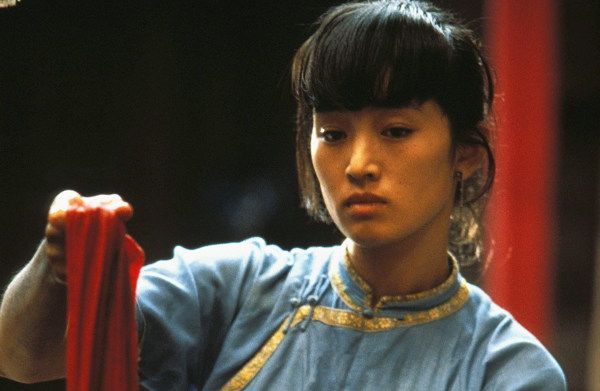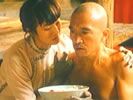Eye For Film >> Movies >> Ju Dou (1990) Film Review
Ju Dou
Reviewed by: Amber Wilkinson

Zhang Yimou’s third film, directed alongside Yang Fengliang, was his third collaboration with Gong Li. It is a visual masterpiece which could be viewed as a companion piece to Li and Yimou’s later film Raise The Red Lantern. While this is - by a fine margin - the lesser of the two films, both are visually stunning and concern the ‘fate of women’ at the hands of men and, by extension, society.
Here, Gong Li plays the title role of Ju Dou, the third, newly wed wife of embittered dye house owner Jin-shan (Li Wei) who takes out his anger at the lack of a son on his put-upon nephew Tian-quing (Li Baotian). It quickly becomes apparent that Jin-shan tortured his previous two wives to death as the result of them failing to bear children – the implication being, of course, that the fault really lies with him.

You might think it’s just as well for Ju Dou, then, that she falls for Tian-qing, since he is younger and fertile. But as with all great tragedies, you sense that despite their initial happiness at getting one over the evil old man when she falls pregnant, they may well have sown the seeds of their own doom.
Like the dye house, the film is drenched in colour. Skeins of cloth decorate every scene and are used, alongside vats of dye, as symbols of love and death. Gong Li is as beautiful as always, steely and feminine at the same time. The plot, although essentially a tragedy, also contains elements of finely played comedy and subtle horror as the child of their illicit liaison takes on spawn-of-satan-like qualities.
As well as having an eye for the dramatic – such as yards of cloth tumbling from a height or flames licking up a wall – Yimou also has a way of conveying the emotion of a scene with incredible brevity. Marital abuse, for example, is perfectly encapsulated in a single scene which shows Jin-shan sitting on a donkey’s saddle on top of Ju Dou, raining scorn down upon her not blows. It is this ability to tell the story visually that helps his actors to shine.
Viewable as an allegory for the old and new guard in China, a strong statement on pre-revolution socio politics or simply as a tale of doomed romance, this film is bold, beautiful and breathtakingly brilliant… bring a tissue.
Reviewed on: 09 Mar 2007

















